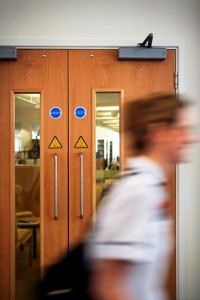Mechanical door closers are frequently specified on the basis of initial purchase cost, but all too often the low purchase price impacts upon on-going maintenance costs and performance. Paul Barrows of Allegion – formerly Ingersoll Rand Security Technologies – explains how these factors can be considered at the specification stage to save on costs, and the inconvenience of re-visiting previous projects later along the line.
Door closers are regarded as a commodity product, with very little thought given to their performance other than the initial purchase price. When anything goes wrong, end-users turn to the subcontractor who originally fitted them who has to pick up the problem and process the associated costs.
The problem with a purchase price approach to specification is that mechanical door closers are often subject to very heavy usage, particularly when fitted in high traffic areas in public buildings. But the problems don’t stop with the mere opening and closing of doors.
Real world conditions impose strains on mechanical door closers which do not come to light in manufacturer test bed conditions. Forced openings and door misalignment lead to sagging doors and frames and bent arms, amongst other problems. In turn, this causes damage to the internal workings of the door closer and can ultimately lead to the door closer failing to perform as it should.
At this stage, bigger problems start to occur. There will be a loss of door control, with unreliable closing and associated safety and security risks. Inevitably, this will lead to increased costs and re-visits for door replacement, maintenance and door frame repairs.
What’s more, associated ironmongery is always subject to additional stress if a door closer malfunctions and the lifecycle of the door and hinges is seriously impaired. Any carpenter will tell you that there are only so many times that you can put screws into the same fixing holes. Eventually, repairs will have to be made to the door and frame which causes further inconveniences to the locksmith.
Unfortunately, whilst door closer standards are useful in specification, in the UK a CE mark does not tell the whole story. A CE marked 1154 door closer will typically be tested to circa 500,000 cycles which sounds a lot, but in practise may only equate to one year’s operational activity.
A much better approach to door closer specification is total lifecycle cost. At the base level a CE marked 1154 door closer is tested to 500,000 cycles, however, in a hospital application for example, the door could easily complete its 500,000 cycles in a single calendar year. Over 20 years, the door closer will thus need to be replaced on an annual basis, meaning a 20 fold increase on the initial purchase price.
It’s clear how the whole life cost of a door closer can quickly increase above and beyond the initial purchase price. Damage to associated products and inflation can also be problematic whereas a premium product tested to a level beyond the current CE markings has the potential to demonstrate significant savings within two years, when fitted on high traffic doors.
My advice is for high traffic applications and performance to be considered above and beyond the basic requirements of CE marked products, it is necessary to look at the whole life cost of a door closer and capabilities once in place.
Box-Out
Allegion recently launched a new range of door closers, specifically designed to offer market-leading cam-action technology at a competitive price point.
The Briton 2300 Series Surface Mounted Closers and 2400 Series Concealed Closers comprise a host of innovative solutions to meet the needs of the healthcare, education and commercial sectors; delivering high quality, precision manufactured units for exceptional ease of use and reliability. It incorporates the same high efficiency cam-technology as the Briton 2700, allowing users to enjoy the same ease of use and is available with either a slide in trimplate or with a curved ‘softline’ all-over cover. The 2300 model comes with adjustable power sizes 2-4.
For environments requiring concealed cam-technology door closers, the Briton 2400 series is suitable for doors 44mm thick. Delivering the same product quality as the new door mounted options, this model offers an aesthetically pleasing solution with additional protection from vandalism.
As with all Briton cam-action closers, the 2300 and 2400 series conform to the requirements of EN1154 and have been tested to 500,000 cycles.

